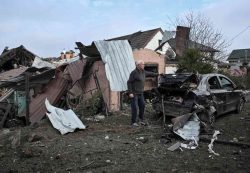
Medics prepare premature babies for transport to Egypt after they were evacuated from Shifa Hospital in Gaza City to a hospital in Rafah, Gaza Strip on Nov. 20, 2023.
11:57 JST, February 8, 2024
DEIR AL-BALAH, Gaza Strip (AP) — Zainab al-Zein was forced to make a desperate decision: Feed her infant daughter solid foods that her tiny body may not be able to digest or watch her starve because of a lack of baby formula in the besieged Gaza Strip.
Al-Zein chose to give 2 1/2-month-old Linda solids, knowing the choice could lead to health issues.
“I know we are doing something harmful to her, but there is nothing,” said al-Zein, feeding her wailing daughter crushed biscuits in the cold tent they now call home. “She cries and cries continuously.”
The war between Israel and Gaza’s Hamas rulers has sparked a humanitarian catastrophe that has brought shortages of the most basic necessities. Some of the hardest-hit are babies, young children and their parents, with diapers and formula either hard to find or spiking to unaffordable prices, leading parents to resort to inadequate or even unsafe alternatives.
Their plight is further complicated due to sporadic aid deliveries that have been hobbled by Israeli restrictions and the relentless fighting.
Displaced Palestinians are also being squeezed into ever tighter areas of the tiny coastal enclave, prompting outbreaks of illness and disease, to which malnourished children are particularly vulnerable. The U.N. says the population is at imminent risk of famine, with a quarter of people already starving.
For Palestinians enduring increasingly dire conditions, the most basic of acts — such as changing a child’s diaper — have become a luxury that can require sacrifice.
“I sold my children’s food so I can buy diapers,” said Raafat Abu Wardeh, who has two children in diapers.
Aid is not reaching everyone, and shortages of basic goods have caused prices to skyrocket. With Gaza’s economy decimated, few Palestinians have regular incomes and most are either depleting their savings or subsisting on handouts.
At makeshift street stalls, older children working as hawkers sell individual diapers for three to five shekels ($1 to $1.50) or entire packs for up to 170 shekels ($46). A pack of diapers before the war cost 12 shekels ($3.50).
“The prices of diapers are very ridiculous,” said Anis al-Zein, who was buying them along a street in central Deir al-Balah and is not related to Zainab. “A child costs you 20 shekels ($5) a day. Especially in a bad situation like this, all prices are high and there is no income for people. There isn’t even aid.”
Some parents are using cloth diapers, but those require washing with water, which is also scarce.
Mohammed al-Khatib, the local program manager for the U.K.-based Medical Aid for Palestinians, said some people have been forced to buy smaller diapers and tape them together.
Lack of fresh produce, the proliferation of unregulated food stalls and cold weather has contributed to the spread of illness, including respiratory infections, skin rashes and diarrhea. “It is winter, and the kids are wet most of the time,” al-Khatib said.
The war, triggered by the deadly Oct. 7 Hamas assault on southern Israel, has unleashed unimaginable destruction, with more than 27,000 Palestinians killed and close to 67,000 wounded in Israel’s offensive, according to local health officials.
The Health Ministry in Hamas-run Gaza does not differentiate in its count between civilians and combatants but says two-thirds of those killed were women and children. Israel blames Hamas for the high death toll because the group carries out attacks and militant activities in residential areas.
The Hamas attack killed about 1,200 people in Israel, most of them civilians, and roughly 250 were taken hostage.
The lack of diapers has added to the poor sanitary conditions for the estimated 1.7 million displaced Palestinians, many of whom are crammed into overcrowded shelters.
The United Nations’ children’s agency UNICEF said this week that most of the newly displaced have only 1-2 liters (50-67 ounces) of water a day to drink, cook and wash. It said chronic diarrhea among children was ticking up.
UNICEF says aid deliveries into Gaza are not meeting the vast needs.
The agency estimates 20,000 infants up to 6 months old need formula, which UNICEF has been delivering along with necessities that have also included diapers and cash.
“This is far from being enough to address the colossal needs of the children in Gaza,” said UNICEF spokesperson Ammar Ammar.
The needs of infants are part of a broader threat to all 335,000 children in Gaza under 5 years old, who are at high risk of severe malnutrition and preventable death, UNICEF said.
“For many families in Gaza, the threat of dying from hunger is already real,” Ammar said.
The U.N. humanitarian office said Wednesday that recent screenings show that nearly 10% of children under the age of 5 suffer from acute malnutrition, a 12-fold increase from before the war. The rate is even higher in northern Gaza, which has been largely cut off from aid for months.
For Zainab al-Zein, the difficult choice to feed her now-4-month-old baby crushed biscuits and ground rice instead of formula has meant frequent trips to the local hospital, which like Gaza’s health care system at large is under deep strain from the war.
Health care providers typically recommend parents wait until their child is 6 months old before feeding them solids. Research has found that babies who are given solid food too early are at higher risk of developing certain chronic diseases.
Rocking in an infant bouncer and swaddled in a blanket, Linda cried ceaselessly as her mother tried to feed her.
“This is known, of course, as unhealthy eating, and we know that it causes her intestinal distress, bloating and colic,” said al-Zein. “What can I do?”
"News Services" POPULAR ARTICLE
-

American Playwright Jeremy O. Harris Arrested in Japan on Alleged Drug Smuggling
-

Japan’s Nikkei Stock Average as JGB Yields, Yen Rise on Rate-Hike Bets
-

Japan’s Nikkei Stock Average Licks Wounds after Selloff Sparked by BOJ Hike Bets (UPDATE 1)
-

Japan’s Nikkei Stock Average Buoyed by Stable Yen; SoftBank’s Slide Caps Gains (UPDATE 1)
-

Japanese Bond Yields Zoom, Stocks Slide as Rate Hike Looms
JN ACCESS RANKING
-

Keidanren Chairman Yoshinobu Tsutsui Visits Kashiwazaki-Kariwa Nuclear Power Plant; Inspects New Emergency Safety System
-

Imports of Rare Earths from China Facing Delays, May Be Caused by Deterioration of Japan-China Relations
-

Tokyo Economic Security Forum to Hold Inaugural Meeting Amid Tense Global Environment
-

University of Tokyo Professor Discusses Japanese Economic Security in Interview Ahead of Forum
-

Japan Pulls out of Vietnam Nuclear Project, Complicating Hanoi’s Power Plans


























